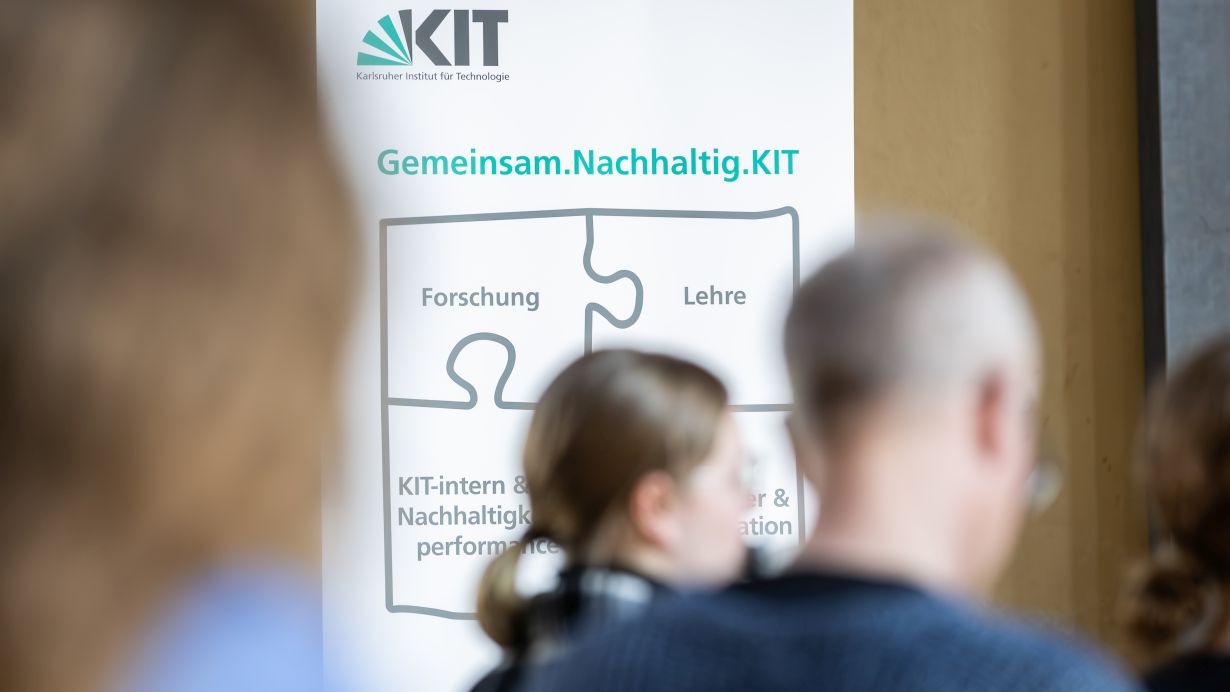
In a broad participatory process, Karlsruhe Institute of Technology (KIT) has advanced its strategic goal to establish sustainability as a strategic cross-cutting issue. The recently completed "Basic Project Sustainability" sets a new course for the Research, Teaching, Innovation, and Transfer core tasks as well as for everyday operations and campus life. As part of its umbrella strategy and in line with its "Science for Impact" leitmotif, KIT demonstrates how cutting-edge research, an exciting teaching strategy, and knowledge transfer contribute to a sustainable development.
Shaping sustainability together - this was the central theme of the "Basic Project Sustainability" set up by KIT's Executive Board in early 2024. During the one and a half years that followed, about 400 researchers, teachers, staff, and students got involved in activities such as workshops, an ideas competition, and a KIT-wide survey in which more than 3,200 persons participated. Four work packages were established to underpin the sustainability strategy adopted in 2022 with specific measures prioritized on the basis of particular criteria. These led to decisions made by the Executive Board for implementation.
Professor Kora Kristof, Vice-President Digitalization and Sustainability at KIT, who was overall responsible for the project, says: "The project's success is based on the strong commitment of KIT's employees and students - from technical stimuli and the participation in workshops to the close cooperation of the specialist departments with the project team. The broad and dedicated involvement was decisive to effectively establish sustainability."
Project manager Christina Benighaus from KIT's Institute for Technology Assessment and Systems Analysis, adds: "Sustainability affects us all and we can only succeed in taking it further by working together. The widespread support and the collective knowledge of the KIT Community made it possible to develop innovative solutions and create acceptance for change."
Sustainability - Exploring It, Teaching It, and Bringing It to the World
KIT demonstrates its particular strength in the "Research" work package. With its know-how, its excellent research infrastructures, and its long-standing expertise in the operation of real-world laboratories, KIT is able to do even more intense research on sustainability in the future. Topic fields are: heat and energy transition, sustainable mobility, resource conservation, and circularity, as well as adaptation to climate change. The results will be closely linked with KIT's program-oriented research as a member of the Helmholtz Association, and with its Structure and Development Plan. This creates a stable foundation for cutting-edge research in the context of sustainability.
The "Teaching" work package puts the focus on the further development of KIT's teaching activities for education for sustainable development (ESD). The range of new approaches in this field stretches from the criteria-based identification of sustainability-oriented courses in the course catalog to the development of new study programs. Three KIT departments as well as the Center for Teacher Education are already testing specific ways of implementation.
In the "Innovation and Transfer" work package, new formats were created that increase the external impact of sustainability: transfer hub, crowdfunding, qualification offers, such as the "Train-the-Transferer" training, and meetings with politicians as well as strengthening of real-world lab research.
Own Actions in Campus Life and Operations
The work package targeting KIT as an organization focused on the behavior within the bounds of KIT. Eight follow-up projects were launched to make campus life at KIT more sustainable, including intelligent energy and load management, more sustainable mobility at and between the various sites, climate-friendly garden maintenance, and an efficient remediation-oriented use of spaces as well as an internal marketplace for common resource usage. Moreover, the integration of sustainability as a multidisciplinary issue in the entire institution will be intensified through new sustainability bodies.
As a large German science institution and in keeping with its "Science for Impact" leitmotif, KIT is advancing the development of sustainability technologies, solutions, and methods. The results of the "Basic Project Sustainability" and the implementation processes that have been started are essential building blocks in this effort.
Being "The Research University in the Helmholtz Association", KIT creates and imparts knowledge for the society and the environment. It is the objective to make significant contributions to the global challenges in the fields of energy, mobility, and information. For this, about 10,000 employees cooperate in a broad range of disciplines in natural sciences, engineering sciences, economics, and the humanities and social sciences. KIT prepares its 22,800 students for responsible tasks in society, industry, and science by offering research-based study programs. Innovation efforts at KIT build a bridge between important scientific findings and their application for the benefit of society, economic prosperity, and the preservation of our natural basis of life. KIT is one of the German universities of excellence.






